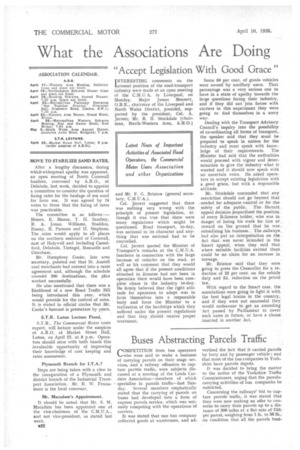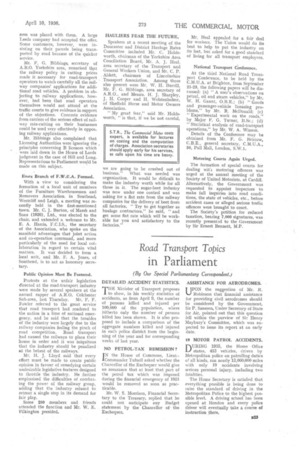Buses Abstracting Parcels Traffic
Page 36

Page 37

If you've noticed an error in this article please click here to report it so we can fix it.
COMPETITION from bus operators who were said to make a business of carrying parcels on their stage services, and a railway offensive to capture parcels traffic, were subjects discussed at a meeting of the Leeds Carriers Association—members of which specialize in parcels traffic—last Sunday. Several members emphatically stated that the carrying of parcels on buses had developed into a form of express parcels service, which was seriously competing with the operations of carriers.
It was stated that one bus company collected goods at warehouses, and ad
vertised the fact that it carried parcels by lorry and by passenger vehicle ; and that most of the bus companies in Yorkshire have parcels depots.
It was decided to bring the matter to the notice of the Yorkshire Traffic Commissioners, urging that the parcelscarrying activities of bus companies be restricted.
Concerning the railways' bid to capture parcels traffic, it was stated that they were now making an offer to concerns to carry their parcels up to a distance of 300 miles at a flat rate of lid. per parcel, weighing from 1 lb. to 56 lb., on condition that all the parcels busi
ness was placed with them. A large Leeds company had accepted the offer. Some customers, however, were insisting on their parcels being transported by road because of the quicker service.
Mr. F. G. Bibbings, secretary of A.R.O. Yorkshire area, remarked that the railway policy in cutting prides made it necessary for road-transport operators to watch carefully all the railway companies' applications for additional road vehicles. A problem in objecting to railway applications, however, had been that road operators themselves would not attend at the traffic courts to give evidence in support of the objections. Concrete evidence from carriers of the serious effect of railway rate-cutting on their businesses could be used very effectively in opposing railway applications.
Mr. Bibbings also complained that Licensing Authorities were ignoring the , principles concerning B licences which were laid down in the House of Lords judgment in the case of Hill and Long. Representations to Parliament would be made on this subject.
Essex Branch of F.W.R.A. Formed.
With a view to considering the formation of a local unit of members of the Furniture Warehousemen and Removers Association. in Southend, Westcliff and Leigh, a meeting was recently held in the first-mentioned town. Mr. C. J. Burton, of Marsh and Sons (1926), Ltd., was elected to the chair, and extended a welcome to Mr. E. A. Harris, F.C.I.S„ the secretary of the Association, who spoke on the manifold advantages that joint action and co-operation command, and more particularly of the need for local collaboration in regard to certain vital matters. It was decided to form a local unit, and Mr. P. A. Jones, of Southend, is to act as honorary secretary.
Public Opinion Must Be Fostered.
Protests at the unfair legislation directed at the road-transport industry were made by several speakers at the annual supper of A.R.O. Colchester Sub-area, last Thursday. Mr. F. F. Fowler referred to the great service that road transport had rendered to the nation in a time of national emergency, and he said that the troubles of the industry were largely due to the railway companies feeling the pinch of road competition. Road transport had caused the railways to place their house in order and it was iniquitous that the industry should be penalized at the behest of the railways.
Mr. H. J. Lloyd said that every effort must be made to create public opinion in favour of remedying certain undesirable legislative features designed to throttle the industry. He further emphasized the difficulties of combating the power of the railway group, adding that the industry refused to retreat a single step in its demand for fair, play.
Some 200 members and friends attended the function and Mr. W. E. Filkington presided, HAULIERS FEAR THE FUTURE.
Speakers at a recent meeting of the Doncaster and District Haulage Rates Committee included Mr. C. Holdsworth, chairman of the Yorkshire Area Conciliation Board, Mr. A. J. Heal, area secretary of the Transport and General Workers Union, and Mr. C. P. Ablett, chairman of Lincolnshire Transport Association. Among those also present were Mr. W. H. Burrill, Mr. F. G. Ribbings, area secretary of A.R.O., and Messrs. H. J. Sharpley, J. H. Cooper and H. Wolstenholme, of Sheffield Horse and Motor Owners Association.
" My great fear," said Mr. Holdsworth, "is that, if we be not careful,
we are going to be crushed out of business." 'What was needed was organization. It would be difficult to make the industry worth while for all those in it. The sugar-beet industry was now under one control and was asking for a fiat rate from the railway companies for the delivery of beet from all factories. "Try to get together as haulage contractors," he said, "and get some flat rate which will be workable for you and satisfactory to the factories." Mr. Heal appealed for a fair deal for workers. The Union would do its best to help to put the industry on its feet, but asked for a good standard of living for all transport employees.
National Transport Conference.
At the third National Road Transport Conference, to be held by the C.M.U.A. at Brighton, from September 21-23, the following papers will be discussed: (a) " A user's observations on petrol, oil and steam vehicles," by Mr. W. H. Gaunt, 0.13,E.; (b) "Goods and passenger-vehicle licensing problems," by Mr. R. McDonald; (c) " Experimental work on the roads," by Major F. G. Turner, B.Sc.; (d) " Statistical analysis of road-transport operations," by Mr. W. A. Winson.
Details of the Conference may be obtained from Mr. F. G. Bristow, C.B.E., general secretary, C.M.U.A., 50, Pall Mall, London, S.'W.1.
Motoring Courts Again Urged.
The formation of special courts for dealing wits motoring offences was urged at the annual meeting of the Society of United Motorists, at Cardiff. Alternatively, the Government was requested to appoint inspectors to make full inquiries into road conditions, the state of vehicles, etc., before accident cases or alleged serious traffic offences were brought to court.
The Society's petition for reduced taxation, bearing 7,000 signatures, was recently present.-td to the Government by Sir Ernest Bennett, M.P.




















































































